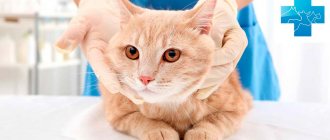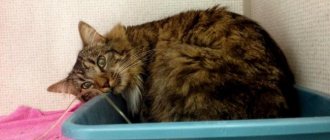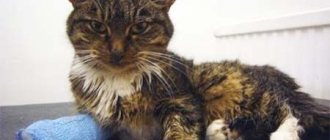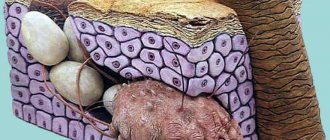The statistics on the incidence of urological pathologies in pets is not reassuring. About 15% of cats are susceptible to serious problems with the excretory system, and when a cat’s kidneys fail, what to do, is it really possible to help the animal? Renal failure can develop quickly in the case of an acute form and over a long period of time, in the form of a chronic course of the disease. The disease manifests itself in the severe condition of the animal, often leading to death.
Causes
Renal failure is understood as a syndrome that occurs against the background of concomitant diseases affecting the genitourinary system. Such diseases include nephrosis, pyelonephritis, urolithiasis and other kidney pathologies. Kidney failure can develop as a complication of diabetes mellitus, pneumonia, vasculitis, leptospirosis, etc.
There are often cases when a cat’s genitourinary system suffers due to poisoning with toxic substances, which occurs, for example, as a result of long-term use of medications. The load on the kidneys increases, as they try to fulfill their direct responsibility as quickly as possible - remove toxins from the body. This can lead to serious consequences, including organ destruction.
Finally, a factor that provokes kidney failure may be your furry's genetic predisposition to certain diseases, for example, polycystic disease, glomerulonephritis.
Renal failure is characterized by two forms of the disease: acute and chronic.
Acute failure is the most dangerous, as in most cases it ends in death. It proceeds rapidly and has a pronounced clinical picture. ARF, in turn, also occurs in three forms: prerenal, renal, postrenal.
Veterinarians say that the most serious form is renal. Regarding prerenal and postrenal, the prognosis is rather favorable.
In chronic renal failure, the kidneys gradually cease to perform excretory functions. For a long time, chronic renal failure may not manifest itself at all. This is why she is dangerous. Kidney cells die gradually, the load is redistributed between healthy cells, but then they die.
Damaged tissues become scarred, causing the kidneys to decrease in size and no longer cope with their duties. As a rule, chronic renal failure is diagnosed in older cats.
CRF has four stages: latent, initial, conservative, terminal.
The latent form has the greatest chance of a favorable outcome, but timely diagnosis occurs in the rarest cases. In case of terminal illness, unfortunately, it is no longer possible to help the animal, so the only way to stop the pet’s suffering is euthanasia.
Common feline kidney diseases
The most common and widespread kidney diseases in cats are caused by various inflammations and bacteria - all types of nephritis, cystitis. Since the organ filters blood, any infection that gets into it will certainly get there. If the disease is not treated in the acute stage, it quickly becomes chronic and causes problems for the cat for the rest of its life. Let's list the kidney diseases of furry animals, which are quite common:
Jades . There are three types - hydronephritis, glomeronephritis and pyelonephritis. These are a series of inflammatory kidney diseases caused by harmful bacteria entering the bloodstream and then into the kidneys. They can affect either one of them or both at once.
Polycystic disease . The disease is hereditary and cannot be cured. Such kidney diseases are typical for cats of certain exotic breeds, for example, Himalayan and Persian. It is accompanied by the appearance in the kidney tissue of small cavities filled with functional fluid. It is impossible to detect cysts in a kitten, although it may already be born with such a problem. Only an adult can be diagnosed with polycystic disease.
Amyloidosis . It is a consequence of a malfunction in metabolism, protein-carbohydrate balance and is accompanied by the accumulation and deposition of amyloid in the tissues of the organ. Although amyloidosis affects cats of all breeds, it is more often found in Somali and Abyssinian cats.
Congenital kidney anomalies . These include dysplasia, when the development and growth of an organ is abnormal, and aplasia, the absence of one or both kidneys. In the second case, the kitten has no chance to survive.
The kidneys in cats, like those in humans, consist of nephrons that are not capable of regeneration. Therefore, any disease must be treated, preferably at the earliest stages, so that it does not turn into chronic failure. Up to 20% of cats die from this diagnosis.
It is the advanced forms of kidney disease that lead to the fact that this organ is not able to perform the functions assigned to it by nature. The result of this is a metabolic disorder in the cat’s body, which leads to inevitable death.
Symptoms
If we are not talking about an acute form of renal failure, then for a long period the pathology occurs in a latent form. Gradually the cells die, but the kidneys continue to work. Characteristic signs of renal failure appear when the volume of damaged tissue is more than 70%.
A cheerful and active pet becomes lethargic, sleepy, gets tired quickly and lies down most of the time. His appetite disappears, and his thirst, on the contrary, increases. Despite drinking a lot of water, the cat rarely goes to the toilet. Even if he manages to pee, the amount of urine is insignificant. The owner notices that the fluffy is constantly licking the genitals.
Then there are digestive disorders - nausea, diarrhea, constipation.
The appearance of a sharp unpleasant odor from the body and mouth of a four-legged pet is typical.
In severe cases, the animal experiences epileptic seizures, convulsions, fever, hypertension, which results in rupture of blood vessels in the eyeball and loss of vision. Intoxication of the body increases, the cat’s condition rapidly deteriorates. The kidneys do not work, causing the pet to fall into a coma and die.
Prevention of kidney disease in cats
Knowing how difficult and life-threatening kidney diseases are in cats, it is better to focus your efforts on their prevention and follow a number of recommendations from veterinarians:
- food for domestic cats must be adapted to their digestive system, that is, in no case should they be “pampered” with salty, sweet, fatty foods and smoked foods, as well as pasta and legumes. Sausage is also not for an animal's bowl,
- The water quality must also be controlled by the owner. As a rule, chlorinated water comes from the tap; it is detrimental to the entire genitourinary system of the cat. Replace the water with filtered water or at least leave it in containers for some time so that most of the chlorine evaporates from it,
- the kidneys can get cold, which will also provoke an inflammatory process. Therefore, try to avoid drafts and strong ventilation during the cold season.
- Just like hypothermia, overheating will have a negative impact on your pet. A furry friend in a hot room absorbs more water, putting a strain on his kidneys,
- and, of course, mobility and mobility again. Young cats rarely get kidney disease because they are more active. But as they age and gain weight, they can become lazy. This is where problems creep in. Stagnation of urine will begin and, as a result, kidney disease. Make your pet move and play more, this will protect him from many problems with the normal functioning of his entire body.
The cat owner must remember that kidney diseases are very insidious . Kidney disease can be chronic and not show itself for a long time. The pain will not bother your pet, and symptoms appear only after some time. Veterinarians strongly recommend paying attention to the appearance and behavior of a friend, especially one over 7 years of age.
In order not to miss the moment, upon the arrival of this period, it is necessary to undergo annual scheduled medical examinations of your domestic cat with the necessary tests and an ultrasound scan.
Diagnostics
Diagnosing renal failure is associated with certain difficulties. It can be carried out qualitatively only in a hospital, using instrumental and laboratory methods.
First of all, blood biochemistry is carried out. The study allows you to find out the level of phosphorus, potassium, creatinine, and urea.
A lot of information can be obtained from a laboratory urine test, in particular, it indicates a change in the composition of the biological fluid, determines the level of leukocytes, the presence of bacteria and renal epithelium. The urine of a sick cat is dark or, conversely, too light and has low density. The content of red blood cells and protein is increased.
An ultrasound of the kidneys is required. It shows the structure of the organ, its location and shape, and the presence of cysts.
To determine the extent of kidney damage, radiography with a contrast agent is performed.
The most accurate information is provided by computed tomography of the kidneys. But due to its high cost, it is used in rare cases.
Cancer
Fortunately, kidney cancer is not very common in cats. Unfortunately, treatment options for kidney cancer are quite limited. Solitary tumors affecting only one kidney can be removed surgically with a very good outcome if the tumor is benign or if the cancer has not spread to other parts of the body (including the opposite kidney). Your cat only needs one good kidney to function properly. If the cancer has already spread throughout the body (as usually happens with lymphosarcoma), surgery will no longer be an option for treatment. Microscopic analysis of a biopsy, that is, material obtained with a small special needle, is necessary for the correct diagnosis of cancer and for an appropriate treatment plan.
Treatment
Kidney failure is one of the incurable pathologies. However, with the help of a well-designed treatment regimen, it is possible to maintain the animal’s quality of life and achieve some improvement in kidney function.
The cat will be under the supervision of a veterinarian for life and undergo regular examinations, including urine and blood tests. In addition, the animal will have to follow a therapeutic diet and take certain medications for the rest of its life.
Treatment depends on the form of renal failure, the general condition and age of the animal.
The acute form is treated according to a regimen that includes:
- elimination of the factor that provoked the deficiency;
- restoration of water balance;
- hemodialysis (artificial blood purification);
- removal of intoxication;
- decreased blood pressure;
- special medical nutrition.
In case of chronic insufficiency, therapeutic measures are aimed at restoring the acid-base, water-salt balance, and stabilizing blood pressure. Elimination of signs of anemia. It is necessary to undergo hemodialysis and use a strict but nutritious and balanced diet.
To improve immunity, it is advisable to use vitamin and mineral complexes.
Slags
Many household items can damage your kidneys, not just antifreeze. Petals, leaves and pollen from lilies, even water in their vase, can cause serious kidney injury when cats nibble, lick or chew the flowers or come into contact with water. This is one type of flower that you should avoid completely if you have a cat! Common OTC medications such as aspirin, other nonsteroidal drugs (NSAIDs), or prescription drugs can all cause kidney disease. Cats, who are known for being picky about food and just about everything else, will still eat pills they find in your medicine cabinet or on the floor, so keep all medications in cat-proof containers. And always discuss the use of any medications with your veterinarian.
If you have any reason to believe that your cat has been poisoned, call your veterinary emergency number immediately for help. Contact us at the following numbers:
8-495-221-81-90
8-495-221-84-70
8-499-136-19-18
What to do at home
The owner must strictly follow the veterinarian's instructions. Self-medication and replacement of traditional methods of conservative treatment lead to detrimental consequences.
A sick pet needs to be provided with quality care and therapeutic nutrition. The diet lasts for at least six months. At this time, salt, sea fish, fatty meats, offal, cereals, and dairy products are completely excluded from the cat's menu. Flour products and fish oil are prohibited.
The diet may consist of poultry (chicken, turkey), broth, vegetables (cabbage, carrots). There are few acceptable products, so veterinarians recommend giving preference to special medicinal dry food.
Cats' weak point
It has been noticed that cats do not drink enough water. Moreover, dry food is now very popular, which is so convenient to feed your pets. They absorb water entering the body, which is why the animal’s kidneys and the entire urinary system certainly suffer. Of course, this is not a call to give up dry food, which contains an ideally selected composition of calories and vitamins.
It is important to always leave water available and in the right quantity for your cat.
In addition, the anatomical feature of the structure of the feline body is also to blame for the diseases of this organ. Their urinary system has several bottlenecks where blockages can occur. Because urine cannot leave the body in time, the kidneys are the first to suffer.
© shutterstock
Nutrition, what food is best to use?
Proplan diet
Recommendations for home nutrition:
- Cats are primarily carnivorous animals, so they always need protein and the amino acids that are present in it. And therefore we advise you to give chicken or veal. The meat must be kept in the freezer for 2 days and then scalded with boiling water. This is done in order to reduce the risk of parasite infection.
- A couple of times a week you can give offal: chicken hearts or liver.
- Consult your doctor and he will prescribe special supplements for you to mix with the food. They will allow you to restore vitamins in the body, and they will speed up the recovery of the organ.
- When sick, do not give your cat fish or seafood. Since they contain a large amount of phosphorus, and this will have a detrimental effect on the condition of the cat’s bones and teeth.
Pet stores sell ready-made, complete food.
Veterinary food for cats
Protein metabolism disorder (amyloidosis)
Patients with amyloidosis lose function of certain organs, including the kidneys, as protein deposits replace normal tissue. It is an unusual consequence of chronic inflammation affecting other parts of the body, or it may be genetic in some breeds such as the Abyssinian, Siamese or Oriental Shorthair. Amyloid deposits cannot be removed, and functional kidney tissue that is lost cannot be replaced, so the prognosis is not good.










